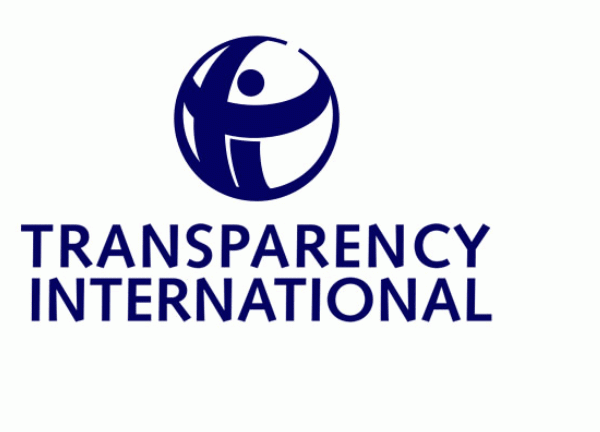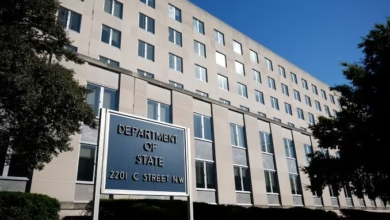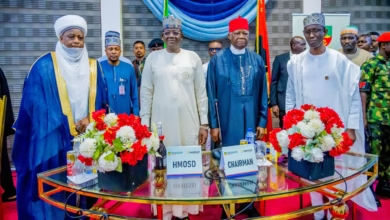News
Why FG Rejected Transparency International Report
*Nigeria did well in majority areas of the report except one, internal review reveals

Details are now emerging why the Buhari administration rejected media reports on the recently released report of Transparency International, TI, which claimed that the perception of corruption in Nigeria had worsened between 2016 and 2017.
According to the TI report, Nigeria ranked 148 out of 180 countries assessed in 2017 on the perception of corruption in the annual Corruption Perception Index, CPI, but a closer review of the TI report indicated clearly that in all of the nine categories of the evaluation, Nigeria fell back in only on category, performing slightly better in som and maintaining stability in others.
The index, published last week Wednesday, showed that out of 100 points signalling maximum transparency and no corruption, Nigeria scored 27 points.
A presidency source revealed that an internal government review of the report indicated that, although TI gave Nigeria an overall lower ranking, the country indeed did well in majority of the areas reviewed by TI, and remained stable in others, but fell back in only one aspect.
The source explained that contrary to reports in some sections of the media, Nigeria improved in many other indexes.
In the 2016 Index, the country was ranked 136th out of 176 countries with a score of 28. Nigeria’s score also slightly improved from 26 to 28 between 2015 and 2016.
“It must also be pointed out that compared to the 2016 Index, Nigeria either improved or remained stable in all, but one of the Indexes,” the source said.
For instance, Nigeria improved significantly in key indexes between 2016 and 2017: the Bertelsmann Foundation Transformation Index, a 5-point improvement; African Development Bank Country Policy and Institutional Assessment, a 2-point improvement; a 1-point improvement in the World Justice Project Rule of law Index Expert Survey and World Economic Forum Executive Opinion respectively.
In the 2016 World Justice Project Rule of Law Index, Nigeria and Burkina Faso were the biggest movers among the 18 countries indexed in the region, climbing 11 and 10 spots respectively.
Our correspondent’s findings further revealed that Nigeria remained stable in the following indexes: World Bank Country Policy and Institutional Assessment, Global Insight Country Risk Ratings; PRS Group International Country Risk Guide and Varieties of Democracy Project.
The only Index the country fell short was in the Economic Intelligence Unit Country Risk Service, on which basis is the sole reason for Nigeria’s decline in the overall Transparency International’s Corruption Perceptions Index of 2017.
The Bertelsmann Stiftung’s Transformation Index evaluates the quality of democracy, a market economy and political management in 129 developing and transition countries, while the African Development Bank Country Policy and Institutional Assessment measures the capacity of a country to support sustainable growth, poverty reduction, and the effective use of development assistance with a particular focus on the assessment of key elements that are within the country’s control. Nigeria improved in this categories in the Transparency International’s report.
Going by these findings, the Buhari administration’s effort in tackling corruption is perceived to have improved; which is given credence by the improvement in these indexes.
“President Muhammadu Buhari remains fully committed to combating corruption, despite the challenges, and this administration will not relent in doing so in all areas. With hundreds of convictions secured by the EFCC alone in 2016 and 2017, and assets worth billions of naira recovered, it is evident that the Economic and Financial Crimes (EFCC) under the Buhari administration has made significant strides in the fight against corruption,” another source in the EFCC revealed, adding that the administration believes in the rule of law and the sanctity of the judiciary in ensuring that these cases are duly prosecuted.
The report also showed that in 2013 Nigeria scored 25, but jumped to 28 in 2016, a year after the Buhari Administration took office.
When contacted Mr. Laolu Akande, a Senior Special Assistant on Media & Publicity in the Presidency stated that under the Buhari administration, there have been clear procedures and accountability governing the allocation and use of public funds in Federal Government’s Ministries, Departments and Agencies, MDAs. Akande confirmed the outcome of an internal review of the TI report.
For instance he noted that the implementation of the Treasury Single Account (TSA) by this administration has also helped the country to save billions of naira. In addition, through the TSA and other interventions, the Federal Government has made sweeping reforms to block several leakages of public funds, he explained.
“In 2016, for instance, the Presidential Initiative on Continuous Auditing (PICA) discovered discrepancies in the payroll of several MDAs to the tune of N5.7 billion monthly. Also, over 50,000 ghost workers have been uncovered by the audit team, as a result, over N120bn has been reportedly saved.
He added that in a similar vein, “leakages of unremitted funds have been blocked in many of country’s Revenue Generating Agencies, which have seen an increase in their revenues in recent times.
“The Nigeria Customs Service, NCS, remitted N1 trillion into the Federation account, the highest ever remittance by the agency, despite the country being in recession half of the year.”
Akande also disclosed that just like the Customs agency, the revenue generated by the Joint Admissions and Matriculation Board, JAMB, has also increased. The exams body remitted about N7.8 billion to the FG in 2017, a stark contrast to the paltry N3 million that was the highest remitted by the agency before.
Following leadership reforms under this administration, the agency has also been able stop massive fraud.
In the same vein, the 2017 half-year remittance of the Nigerian Maritime Administration and Safety Agency (NIMASA) was more than its 2015 and 2016 combined.
“You can see that these developments are indicators that demonstrate public confidence in the administration and the steady success in tackling corruption in the public sector.
“The administration’s whistle-blower policy which was introduced in December 2016 by the Federal Government to tackle corruption – a first of its kind government initiative in the country – has also helped in the area of accountability in the use of public funds in different sectors of national life.
“Out of the about 5,000 reports made, about 365 were actionable as at July 2017. While 39% of these reports were related to the diversion of funds, 15% related to violation of TSA,” according to Akande.
It would be recalled that in April 2017, the EFCC uncovered over N13 billion naira cash in local, foreign currencies in an apartment in Ikoyi, Lagos State. About $43.5m has reportedly been finally forfeited to the FG.
Furthermore, analysts have adjudged Nigeria’s exit out of recession last year, the steady growth in the economy, and the subsequent improvement in the 2018 World Bank Doing Business Index – where the country climbed up 24 places and was placed on the list of 10 most reformed economies globally – as results of the economic policies driven by President Buhari administration.
Also, despite the economic challenges and 60% less revenue, the Buhari administration has been praised in many quarters for being able to still make huge investments on infrastructure projects, providing about N1.3trillion for capital expenditure in 2016, a historic highest budget spend on capital projects. Economic analysts have attributed this to the FG’s prudent management of public resources.





